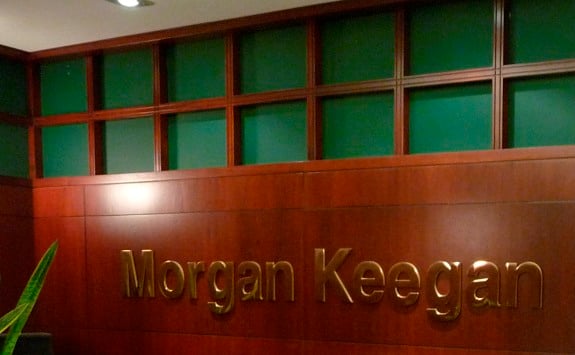Morgan Keegan, the brokerage being sold to Raymond James Financial Corp., lost its bid to be dismissed from an $8 billion lawsuit brought by Canadian insurer Fairfax Financial Holdings Ltd.
Morgan Keegan, the brokerage being sold to Raymond James Financial Corp., lost its bid to be dismissed from an $8 billion lawsuit brought by Canadian insurer Fairfax Financial Holdings Ltd.
Fairfax, in its 2006 lawsuit, accused investors of conspiring with analysts and researchers to spread false rumors and drive down Fairfax’s stock price in a so-called bear raid.
New Jersey Superior Court Judge Stephan C. Hansbury in Morristown ruled today that there was more to the case than whether Morgan Keegan’s analyst reports were free speech protected by the U.S. Constitution’s First Amendment.
“There’s more to this case than the statements made in a couple of reports,” the judge said. “It seems to me an innocent truthful statement could be part of the conspiracy,” he said.
The suit once included as defendants the hedge funds SAC Capital Advisors LP, Third Point LLC and Kynikos Associates LP. The remaining defendants, including New York hedge fund Exis Capital Management Inc., have argued the case doesn’t have enough connection to New Jersey to allow Fairfax’s anti- racketeering counts, which allow for tripling the $8 billion in claims. Toronto-based Fairfax brought other claims in the suit.
September Trial
Hansbury said he will schedule a trial for September. Bruce Collins, a lawyer for Morgan Keegan, told the judge he will file another motion before then to get his client dismissed. Collins declined to comment on the ruling after the hearing.
Fairfax, which owns stakes in Canadian and U.S. insurers, said in its complaint that the hedge funds coordinated with stock analysts so the funds could profit through short sales, selling borrowing shares in anticipation of making money by replacing them with cheaper shares after the price dropped.
The company’s $8 billion damage claim is based on allegations that the hedge funds’ actions depressed Fairfax’s credit ratings, diminished its ability to make acquisitions and reduced the amount it could raise in debt and equity offerings, according to court papers.
On Jan. 17, Memphis, Tennessee-based Morgan Keegan asked Hansbury to dismiss it from the suit because the negative Fairfax reports by its analyst, John Gwynn, were protected speech. Collins argued Gwynn’s reports were protected opinions and that Gwynn wasn’t saying Fairfax engaged in fraud.
‘My Estimates’
“All he’s saying is, ‘I’ve got my estimates, you’ve got yours,’” Collins told Hansbury during the hearing.
Fairfax also said the hedge funds coaxed Gwynn into giving them his negative Fairfax reports before they were published. Morgan Keegan fired Gwynn in 2008 for disclosing research on Fairfax to selected clients before publication, the brokerage said at the time. He has since died.
Fairfax said Gwynn misrepresented the company’s finances in his reports, including its reserves for claims.
“Morgan Keegan was part of this conspiracy,” James Stricker, a lawyer for Fairfax, told Hansbury. “They fired John Gwynn for illegal tipping.”
Christopher Brett Lawless, a former analyst at Fitch Group Inc. who was sued by Fairfax, also lost a bid to be dismissed on First Amendment grounds.
“There’s no evidence of an actionable false statement by Lawless,” Anthony Enright, one of his lawyers, told the judge. “Lawless didn’t have one dime to gain or lose from the performance of Fairfax. He’s not a hedge fund.”
Enright didn’t immediately respond to a phone call seeking comment on the ruling.
Bloomberg News







